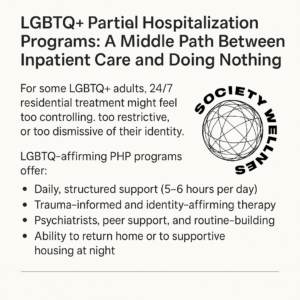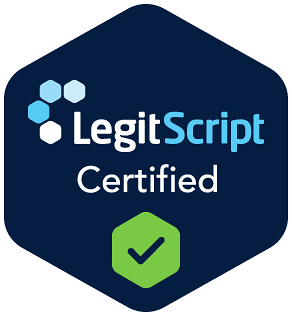You can see what they won’t say.
The mood swings. The missed work. The sudden weight changes, the isolation, the half-answers when you ask, “Are you okay?” Your adult child is struggling. Maybe with substances. Maybe with their mental health. Maybe both. And when you suggest inpatient treatment, the answer is clear: No. Absolutely not.
This is the moment where many parents feel stuck. You’re watching someone you love unravel, but every traditional door you know to push on seems locked. Or worse—your child refuses to walk through.
If your child is LGBTQ+, your concern might be deeper. Not only are they refusing help, but they may also be avoiding care because they’re afraid of being misunderstood, misgendered, or dismissed. And you’re left asking: Is there any kind of treatment that meets them where they are?
There is. A LGBTQ partial hospitalization program (PHP) offers the intensity of a structured environment—with the flexibility and dignity your adult child might still be willing to accept.
The Problem: When Inpatient Care Feels “Too Much”—But Doing Nothing Isn’t an Option
It’s painful to watch your child struggle and still say “no” to the very thing you believe could help them. As a parent, it’s easy to spiral into guilt or blame.
Did I push too hard?
Should I have intervened sooner?
What do I do if they won’t agree to inpatient?
The truth? Inpatient care isn’t the only path—and for many LGBTQ+ adults, it feels emotionally unsafe, especially if they’ve experienced past trauma, identity-based rejection, or treatment settings that minimized or pathologized their experiences.
So when they say “no” to inpatient, it might not mean they don’t want help—it might mean they don’t want that kind of help.
The Hidden Issue: Mistrust, Misalignment, and Not Feeling Safe
Many LGBTQ+ individuals carry valid fears about traditional treatment.
They may have been:
- Misgendered repeatedly in medical settings
- Told their identity wasn’t “relevant” to their treatment
- Treated like their trauma or addiction wasn’t serious because it didn’t look like someone else’s
- Forced to choose between receiving help and being themselves
This makes them understandably hesitant—even resistant—when residential treatment is presented as the only way forward. And for parents, it’s heartbreaking. Because your child might not be refusing help entirely—they’re refusing the kind of help that erases or harms them.
That’s where LGBTQ-affirming partial hospitalization steps in.
The Solution: LGBTQ PHP Is Intensive Care Without the Overnight Stay
A partial hospitalization program offers the kind of structured, daily support usually associated with inpatient care—but without requiring a person to live on-site.
At Society Wellness in Boston, our LGBTQ partial hospitalization program is specifically built to:
- Serve LGBTQ+ adults struggling with addiction, mental health, or both
- Offer 5–6 hours of programming per day, five days a week
- Include trauma-informed therapy that respects identity as a central part of healing
- Provide access to psychiatric care, medication support, and peer connection
- Allow participants to return home or to supportive housing each evening
This format supports autonomy while delivering the clinical intensity needed to create real change.
It says: We see you. We believe you. And we’re here to help you heal as your full self.
Why LGBTQ PHP Often Works When Inpatient Doesn’t
For many adult children, PHP is the first treatment format that doesn’t feel like a punishment or a loss of control. It feels like support they chose, not control they were forced into.
Here’s why it works:
- Daily accountability creates rhythm and reduces risk
- Identity-affirming space lowers shame and builds trust
- Evidence-based care offers real tools—not generic advice
- Group therapy with LGBTQ peers fosters connection instead of isolation
We’ve seen young adults walk into our PHP angry, closed-off, convinced it “won’t work”—and then stay. Because they feel seen. Because they feel safe. And because they’re not being asked to check part of themselves at the door.

What You Can Do as a Parent—Even if They’re Resistant
This situation is hard. You may feel helpless. But here’s what you can do:
- Share information about LGBTQ PHP as a softer, safer option—not an ultimatum
- Validate their fears about inpatient care while offering a real alternative
- Avoid forcing or fixing—just keep the door open
- Remind them that asking for help doesn’t mean giving up control—it means building a life on their own terms
And perhaps most importantly, remind yourself: You are doing your best. Wanting your child safe and whole isn’t control—it’s love.
FAQ: LGBTQ Partial Hospitalization Programs
Is PHP only for people who are sober or stable?
Not necessarily. PHP is often the next step after detox—but it can also serve as an entry point for those who don’t need medical withdrawal management or aren’t willing to enter a 24/7 program.
Can my child live at home while attending PHP?
Yes. That’s part of what makes PHP so appealing. As long as their living environment is safe, they can attend programming during the day and return home each night.
What if my child is nonbinary or transgender?
Our team is trained in gender-affirming care. We honor names, pronouns, and lived experience—and we don’t treat gender identity as a “side issue.” It’s integrated into our clinical approach with respect and nuance.
Will PHP help with mental health and substance use?
Absolutely. Most people we serve are navigating both. Our program is dual-diagnosis, meaning we’re equipped to address addiction, anxiety, depression, trauma, and more—all in one place.
What if they won’t go today—but might in the future?
That’s okay. Keep the conversation open. Ask if they’d consider a consultation or just a phone call. Sometimes knowing there’s an LGBTQ-affirming space ready when they are is the thing that keeps hope alive.
When Inpatient Isn’t an Option—This Can Be the Next Step
If your adult child is LGBTQ+ and refusing inpatient care, it doesn’t mean you’ve hit a dead end. There is another path—one that blends clinical support with identity safety and real autonomy.
Call at(888) 964-8116 or explore our LGBTQ partial hospitalization program in Boston.

